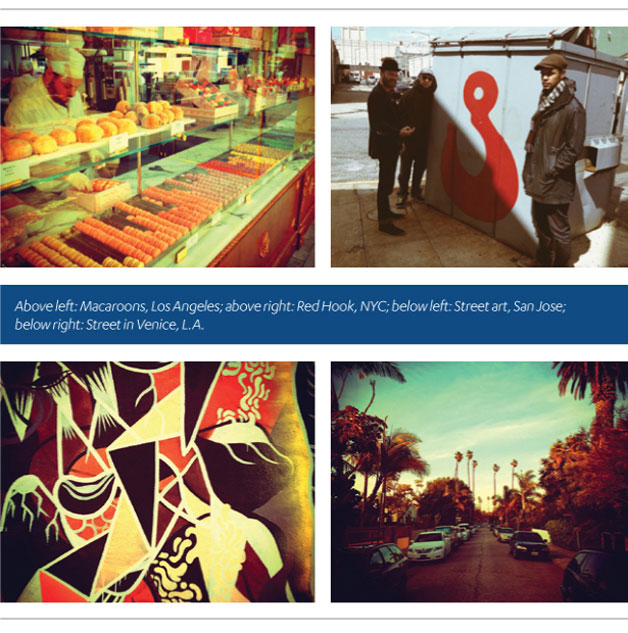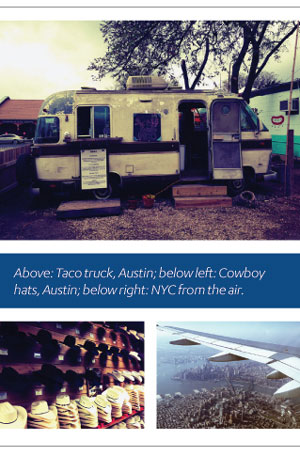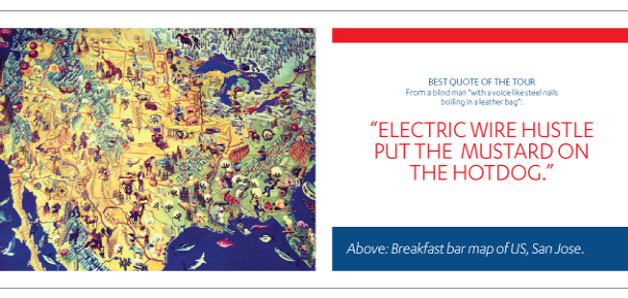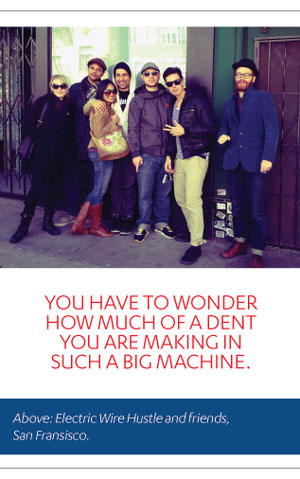Postcard from the USA
Jul 15, 2012


SXSW Festival, Austin, Texas
E pluribus unum (In many we are one)
In Austin airport, I’m reading a commemorative plaque celebrating Barbara Jordan, the South’s first African American woman elected to congress. A bronze statue of her deep in thought stares 1000 yards inward. I have the same kind of look after five flights in four days: Wellington-Brisbane-Adelaide-Auckland-LA-Austin.
So, we made it to Texas. My initial thoughts are always dictated by the landscape: the trees, the oscillations of the land, the skyline, the light. Here an enormous sky bends over us. Only in Australia have I seen more of the heavens at one time. Under this, a grey-green flora rises out of low-lying areas, young and thin. Rolling down the city’s boulevards I see that the richer areas are hooded by large oak trees.
We check into our hotel, one of those ubiquitous ones that smell like old wet washing. Now is a good time to talk about the under classes that work the engine rooms of this country. Most Americans work within the service industry: transportation, entertainment, hospitality, public service etc. On my travels here so far, often I have been greeted, fed and put to bed by Mexicans; who take the hardest lot, I think. They are not even recognised as Americans. The customer is always white, like me. Over here I’m a white man, though I don’t much think or act like one.
Sound is coming from everywhere in Austin: upstairs, downstairs, back alleys and from the streets. While waiting for a slice of pizza from a truck we are engulfed by a batucada band, black and joyous. We must take up the rhythm and join the riot. Ba ba ba ba. The music stops and everyone laughs. The background din fades in; two thousand odd bands from the four corners. We New Zealanders, it could be argued, have come the furthest.
Our band performs five times over the next three days. Some are highbrow affairs, with red carpet and bleached, colourless audiences. Others are on dirt floors out on ghetto fringes. I don’t care where we are as long as people are getting down and the sound is good.
On our last night a storm blows in unlike any I have witnessed before. Thunder shakes our hotel and my mind boggles at the fact that sound itself is moving the building! Lightning rakes, ruptures and splits the air. I don’t get much sleep. We rise at 4 am for a flight to Los Angeles, California.

Los Angeles, California
Every year in certain parts of Southland at the bottom of New Zealand, farmers find eels migrating across their paddocks. This is because the pastures were once wetlands – rich swamps, bogs and marshes; wet nurseries for life – have been converted for sheep and cows. It can take a long time to shock nature out of its habits. This is comforting to know.
Los Angeles is a desert and will always be a desert. If New York is the concrete jungle then LA must be the concrete desert. The shore is only ours until the tide comes in and one feels that, similarly, Los Angeles will eventually be claimed by sun and dust.
Here we are in peculiar circumstances: a local b-grade promoter has offered us a spot playing alongside soul-jazz pianist Robert Glasper. The wonderful singer Bilal is also on the bill and I am interested in meeting him in order to clear something that has been on my mind. A year earlier Bilal turns up to our gig in Santa Monica and just stands there at the front of the crowd stone-walling us. Did he enjoy it? Alas, I don’t get the chance to find out, in the end our part in the show is cancelled.
Truth be told, we need the rest anyway. IEve come down with the flu and the meds Ivve chosen have unexpectedly put me in a strange frame of mind. We have the run of the Biltmore hotel; a grand old thing, opened in 1923, but furnished in 1970. Downstairs there is a vhealth clubh which is a new concept to me. It s not bad; ceramic tiles and polished metal, brass and blue water, lonely as a dockyard. In the steam room a red light is on. A 10-foot boiler is gurgling and spitting from the wall. Yes, I could be on a dockyard in the 1920s in the mist and at the edge of death. I lie there and think about my family on the other side of the planet awaiting my safe return.
The next morning we make for San Francisco, a six-hour drive north of the Angel City.
San Fancisco, California
One of the best parts of my job is meeting other artists whose work I love. Sometimes it is a mutual thing, and there is an instant rapport on one level. Then we hit the town, and end the night laughing in the streets, or in a restaurant telling stories. Tonight in San Francisco we plan on seeing a group of friends met in the way I’ve just described.
 Heading up Highway 5 from LA to San Fran, you enter a strange world indeed. The only food is corn this and corn that. The whole scene is ridiculous: a theme park boils up from the hills in a nest of roller coasters; 100 white birds stalk through a greened field, mono-grazing on some mono-fed insect living in a mono-crop. One God damned thing for 100 miles: grapes, then corn, then cows. Halfway up, we encounter a cattle ranch, absolutely stark, bone dry and bloody raw. Now, I have driven through bovine stench in NZ that will strip paint but this farm in California eclipses anything I have experienced.
Heading up Highway 5 from LA to San Fran, you enter a strange world indeed. The only food is corn this and corn that. The whole scene is ridiculous: a theme park boils up from the hills in a nest of roller coasters; 100 white birds stalk through a greened field, mono-grazing on some mono-fed insect living in a mono-crop. One God damned thing for 100 miles: grapes, then corn, then cows. Halfway up, we encounter a cattle ranch, absolutely stark, bone dry and bloody raw. Now, I have driven through bovine stench in NZ that will strip paint but this farm in California eclipses anything I have experienced.
My spirit will leave this world with that smell.
The relationship with our venue for the night, Yoshi’s Jazz Cafe, gets off to a strange start. The booker for the club is a standoffish African-American guy who treats us like the help – you can see how this starts to mess with my mind. This is an absolutely beautiful bar; architecturally designed, fine sculptural furniture etc. Yet we have to sit in a cupboard out the back like second-rate citizens. It is very strange. The food doesn’t grab me either. There is no art in the food; no effort, no fight. It’s picturesque and bland.
We find our friends from a band called The Starship Connection who play a style of music known as “boogie” or “electro funk” (think Funkadelic/Parliament). The most outgoing among them is a blind man with a voice like steel nails boiling in a leather bag. We talk about kids mostly, and the challenges he will face as a blind father when his children are born. He also gives us the best quote of the tour, yelling out from the audience during a moment of silence: “Electric Wire Hustle put the mustard on the hotdog.”
San Jose, California
San Jose, the proclaimed capital of Silicon Valley, seems as though someone who had no intention of living here designed it. It’s too clean and the streets are too wide; you can hardly see the other side of the road. It is a very odd place. Just look at the wage gap: the city has the highest income per capita in America. At the same time it also has one of the highest numbers of homeless people living on its streets, under its freeways and in its parks. Even so, this many living hard will not unseat San Jose as the country’s richest city, when Google, Facebook, and Hewlett-Packard all have their headquarters here.
There are many opportunities for art. There is a great story in David Choe, the graffiti artist who chose stock instead of $60,000 up front to paint murals in Facebook’s first office space. “I like to gamble” he says and I like his spirit. That stock is now valued at between $200 and $500 million dollars. He didn’t even have to set some poor creature in formaldehyde, or dip anything in gold and diamonds.
We visit the San Jose Museum of Art that houses an interesting collection of technology-based art, utilising electronics, computers, robots! An ordinary looking calculator sits with an equation on its screen:
1+1 =
These numbers then turn into a dragon’s face, that goes on to eat its digital environment before reassembling into its original form. I like it. There are vast amounts of money in the production of this art and I wonder if somebody earning a healthy salary at Google etc isn’t moonlighting as a sculptor of electronics.
As it turns out we are playing in a Chinese restaurant. It’s usually the type of joint you would take Granny to, but once a month a local Filipino cat turns it into a happening scene. The food is terrible. The gig is great; the three most important factors line up: 1. Good sound. 2. Good crowd. 3. Good performance.
End of the night and we have found two Mexican girls to converse and eat with. One speaks with such a thick accent I can hardly make out the words. They’re talking about maize soup and teaching us how to swear in Spanish. Then the food arrives. Cheeseburgers! Oh man. Game Over. We’re done.

New York, New York
“Shipwrecked in the middle of my own body” is how Pablo Neruda felt when he wrote Friends On The Road in 1921. Today I am the same way. My being feels mismatched and faded. Presently, we re in Hollywood and my stomach is in revolt. Irve just eaten a kind of yellow I hadn’t encountered before. I have to lie around like a snake. Entertaining us on one of our last nights in LA is Aaron Byrd, radio host on KCRW. A good man who reserves judgment until the DNA is in. He shows up with malt liquor and four hours of conversation.
 At 4:15am we’re in the taxi from Hollywood to the airport, the rest of the day goes like this: Los Angeles – Detroit – New York. Detroit has turned green since everyone has left. It is very beautiful in this state. I see the interior of a church where, as the spirit has left it, the chalk-pink wallpaper has blistered like feathers upset in a draft. Did I miss the Rapture?
At 4:15am we’re in the taxi from Hollywood to the airport, the rest of the day goes like this: Los Angeles – Detroit – New York. Detroit has turned green since everyone has left. It is very beautiful in this state. I see the interior of a church where, as the spirit has left it, the chalk-pink wallpaper has blistered like feathers upset in a draft. Did I miss the Rapture?
We arrive in Brooklyn at dinnertime. We’re playing a new club called SRB. The sound system is giving us grief; the concrete walls and the apathetic in-house technicians. So I don’t have much to say about the gig. The sound is like a thousand wine glasses breaking in unison with the drummer.
On this night the band is staying around the corner in Red Hook, which in the 1970s had one of the highest murder rates anywhere in America. The place retains something of that era and is cold and industrial. It is in the derelict-hip phase of gentrification and is overrun with cafes; those little mouth brothels that foodies live for. The next morning we have fried eggs with collard greens, which are somewhere between kale and spinach.
Later in Brooklyn … we move out to Flat Bush, a Jamaican neighbourhood not so much in the heart of Brooklyn as in its stomach. I make conversation with strangers just so I can hear the Patois accent. On the subway we see the faces of the people here and listen to them speak. For a moment I am in their world and made to think about their problems. I wonder if they feel a sense of living on the edge? It all seems so precarious. Will they be OK? And how long will the root of the problem, unregulated capitalism, continue?
And so we are here at the end of this journey throughout America. I always feel like I have come through a period of rapid growth at the end of these things. It has been a fruitful investment for my company; our #1 goal was to sign with a booking agent – someone to get us good gigs here – we achieved that. But, I am not sure when I will back. You have to wonder how much of a dent you are making in such a big machine. There is a lyric in a song by The Roots that goes “I’ve lost a lot of sleep to dreams.” And we may have huffed and puffed at the door long enough. Who knows! I have come away with treasure; my encounters with the strange and wonderful people who crossed my path. I am optimistic about the future…